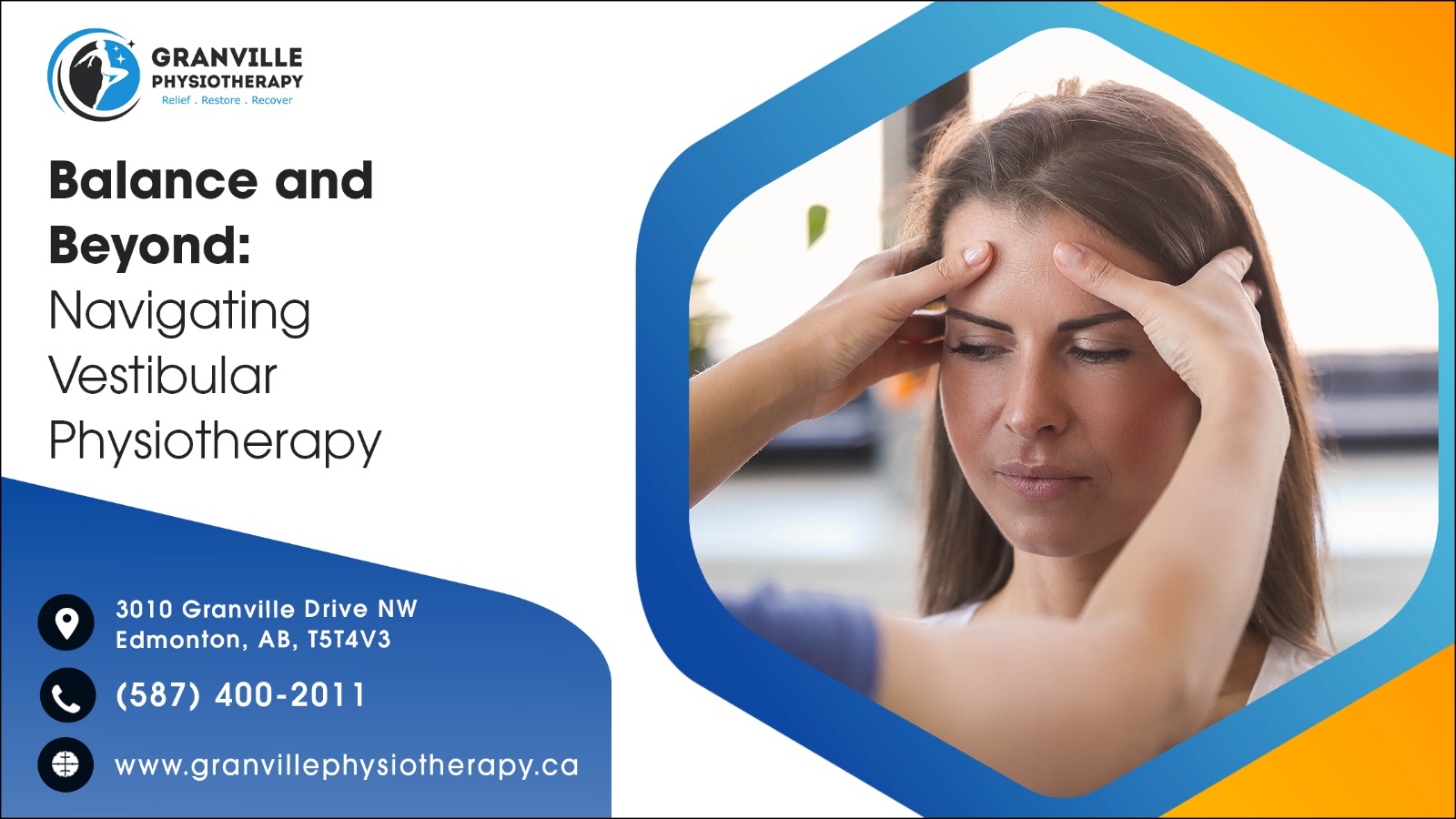At Granville Physiotherapy, nestled in the heart of Edmonton, our commitment to fostering optimal health extends beyond traditional methods. Vestibular physiotherapy Edmonton , a specialized branch of physical therapy, is pivotal in our approach to treating balance disorders and related issues. This guest post delves into the intricacies of vestibular physiotherapy, a key service at our Edmonton clinic, and its role in managing conditions like concussions.
Vestibular Physiotherapy
Vestibular physiotherapy, a niche yet crucial area in the realm of physical therapy, addresses disorders related to the vestibular system – a key component in maintaining balance and spatial orientation. This therapy is designed to alleviate symptoms like dizziness, vertigo, and balance disturbances, often stemming from inner ear disorders.
How Does Vestibular Physiotherapy Help?
1. Canalith Repositioning Procedures (CRP)
Canalith Repositioning Procedures (CRP) stand as a fundamental treatment for BPPV- Benign Paroxysmal Positional Vertigo, which is marked by short-lived but intense spells of vertigo. This gentle, non-surgical method involves coordinated movements of the head and body to guide the misplaced crystals in the inner ear to their right and original location. Following a CRP treatment, many patients report a notable and swift decrease in both the severity and frequency of vertigo attacks. Proficient therapists conduct these procedures with utmost precision and care. Due to its high effectiveness, CRP is widely favoured for alleviating symptoms in individuals affected by BPPV.
2. Gaze Stabilization Exercises
Gaze stabilization exercises are crucial for patients whose vestibular disorders disrupt their vision and balance. These exercises train the brain to maintain visual focus, even when the head is moving. This training is essential for tasks such as reading or walking in a crowded environment where head movement is constant. By practicing these exercises, patients can significantly reduce symptoms like dizziness and improve their overall quality of life.
3. Balance Retraining Exercises
Balance retraining exercises aim to challenge and improve a patient’s stability and proprioception. These activities range from simple tasks like standing on one foot to more complex ones such as navigating heel-to-toe walking or engaging with stability-enhancing tools like foam pads and balance boards. These exercises are particularly advantageous for the elderly or those dealing with long-term vestibular conditions, significantly lowering their fall risk. Consistent engagement in these exercises fosters greater confidence in performing everyday tasks. These exercises are customized to each patient’s ability level, ensuring safe and gradual progress.
4. Vestibular Rehabilitation Therapy (VRT)
VRT is a comprehensive exercise-based program aimed at reducing vestibular symptoms and enhancing balance. It addresses various aspects of vestibular dysfunction, including vertigo, dizziness, balance issues, and gaze instability. These exercises retrain the brain to correctly process signals from the vestibular system and coordinate with visual and proprioceptive inputs. VRT is particularly effective for patients with long-standing vestibular disorders, as it promotes long-term adaptation and recovery. Physiotherapists develop personalized VRT programs, closely monitoring and adjusting them based on the patient’s response.
5. Habituation Exercises
Habituation exercises are designed to decrease the body’s adverse reactions to specific movements that cause dizziness and nausea. By repeatedly exposing the patient to these movements in a controlled environment, the brain learns to cope better with these sensations. These exercises are particularly effective for individuals with motion sensitivity. They are integral to a vestibular rehabilitation program, as they help patients gradually return to normal activities. Physiotherapists carefully select and modify these exercises to suit each patient’s tolerance levels.
6. Functional Retraining
Functional retraining focuses on helping patients return to their daily activities safely and confidently. This involves incorporating real-life tasks into therapy sessions, such as walking on different surfaces, climbing stairs, or bending over. The goal is to simulate everyday challenges in a controlled environment, preparing the patient for real-world scenarios. This method is crucial for restoring independence and enhancing the quality of life. Physiotherapists guide patients through this process, ensuring a safe and effective transition back to daily life.
7. Neuroplasticity Techniques
Neuroplasticity techniques are based on the brain’s ability to reorganize and adapt in response to training and experience. These techniques are particularly beneficial in vestibular rehabilitation, as they encourage the brain to compensate for vestibular deficits. Exercises designed for neuroplasticity may include activities that challenge balance and coordination, promoting brain adaptation. This approach is effective for long-term improvement in balance and reduction of dizziness. These techniques are incorporated into the treatment plans, aiding in the recovery and resilience of the patients.
8. Concussion-Related Vestibular Rehabilitation
Concussion-related vestibular rehabilitation is tailored to meet the specific needs of those recovering from a concussion. Such individuals commonly experience a range of symptoms, including dizziness, issues with balance, and disruptions in visual stability. The comprehensive rehabilitation strategy employs a variety of vestibular techniques, each selected to counter these symptoms effectively. The program’s primary goals are to reestablish balance, enhance the stability of gaze, and diminish feelings of dizziness, all through a methodical, progressive approach. The focus is on restoring balance, improving gaze stability, and reducing dizziness through a structured, step-by-step approach.
Vestibular Physiotherapy: A Comprehensive Approach
In summary, vestibular physiotherapy in Edmonton offers a beacon of hope for those struggling with balance and vestibular disorders. At Granville Physiotherapy in Edmonton, our dedicated team is committed to guiding patients through their journey to regain balance and enhance their quality of life. Our expertise in vestibular and concussion physiotherapy in Edmonton positions us uniquely to address these complex conditions with compassion and proficiency.
